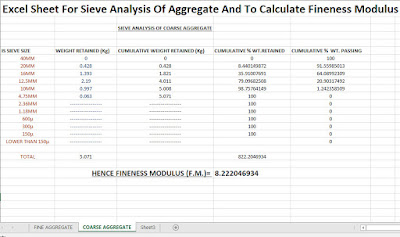Excel Sheet For Sieve Analysis Of Aggregate And To Calculate Fineness Modulus
The sieve analysis, commonly known as the gradation test, is a basic essential test for all aggregate technicians. The sieve analysis determines the gradation (the distribution of aggregate particles, by size, within a given sample) in order to determine compliance with design, production control requirements, and verification specifications. The gradation data may be used to calculate relationships between various aggregate or aggregate blends, to check compliance
with such blends, and to predict trends during production by plotting gradation curves graphically, to name just a few uses. Used in conjunction with other tests, the sieve analysis is a very good quality control and quality acceptance tool.

LINK
The sieve analysis, commonly known as the gradation test, is a basic essential test for all aggregate technicians. The sieve analysis determines the gradation (the distribution of aggregate particles, by size, within a given sample) in order to determine compliance with design, production control requirements, and verification specifications. The gradation data may be used to calculate relationships between various aggregate or aggregate blends, to check compliance
with such blends, and to predict trends during production by plotting gradation curves graphically, to name just a few uses. Used in conjunction with other tests, the sieve analysis is a very good quality control and quality acceptance tool.

LINK
